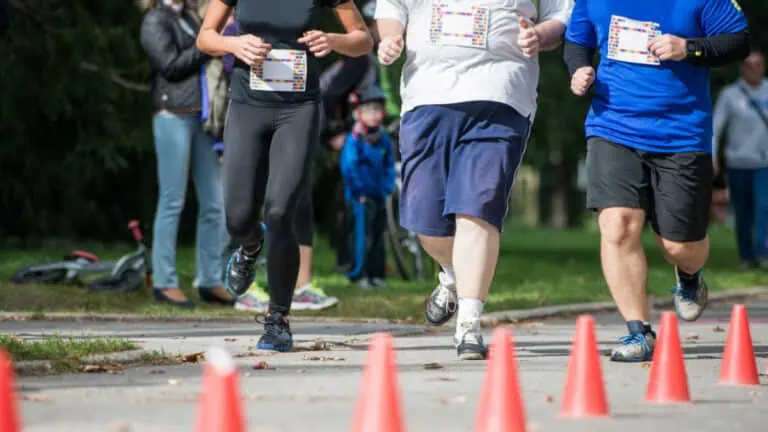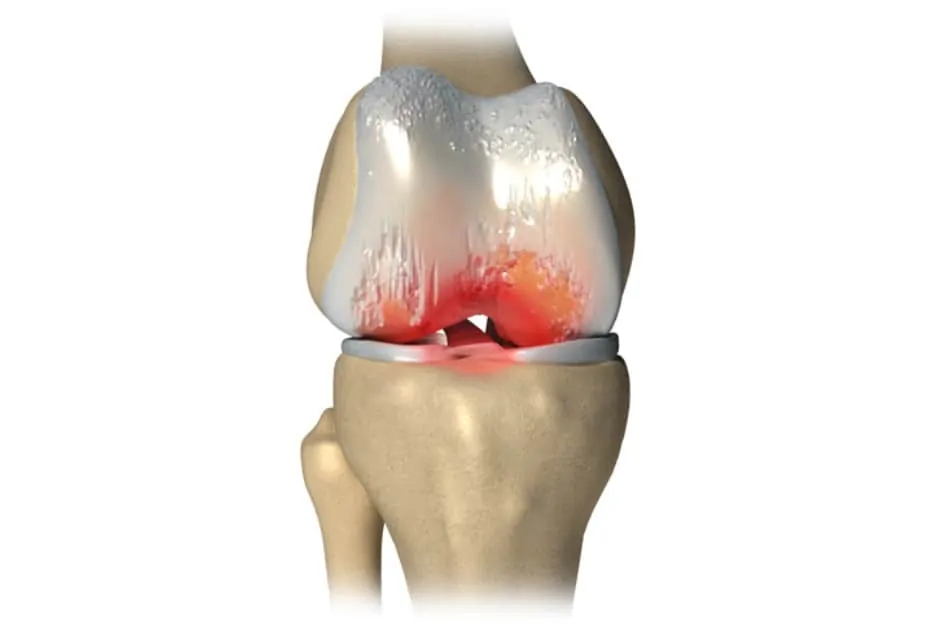I’ve always been a big sports guy (as in, I’m a fat guy that likes to watch sports…)
I’m willing to watch just about any sporting event on TV and I often use it as background noise while I write. Since it’s April, I’ve just marked my calendar to tune into both the Boston Marathon and the London Marathon later this month.
The winners of these races always look so fit and most of the participants you see on TV look like they haven’t eaten a carb in 10 years. It makes you wonder whether a fat person would be able to run for 26 miles. Have you ever wondered about that?
I certainly haven’t. However, I bought my first pair of running shoes in about 10 years last month and have my sites set on running my first 5k so I’ve been curious. Is running a marathon as a big guy a reasonable goal or should I wait until I’ve lost a significant amount of weight?
Well, you’re in luck because I’ve done some research and I’d like to share with you what I’ve found.
What Does It Take to Run a Marathon?
Running a marathon is pretty simple. Well, it’s simple on paper, at least.
You just need enough endurance to keep moving for 26 miles. It doesn’t even need to be an organized event; you can find a two-mile trail and run back and forth on it until you reach the full distance.
Granted, the reason the most famous runners are all in good physical condition is that they work out constantly. That’s true of most sports. It’s one of the reasons why baseball is probably my favorite because you can have a guy who weighs 50 pounds more than the rest of his teammates but he’s on the roster because he hit a ball 425 feet.
So Can Fat People Run Marathons?
In short, yes, fat people can run marathons. There’s no scale at the starting line and no weight limit.
Running is probably the most inclusive sport there is because, as long as you can move forward, you can call it running. Just look at Oscar Pistorius who had both feet amputated at 11 months old and still managed to become an Olympic-level runner (and murderer but that’s a different story).
The only people who can’t or probably shouldn’t start training for a marathon are people with certain health conditions like heart problems or other issues that could make running unsafe. If you’re not sure, I’d check with a doctor.
The other thing I should point out is that just because a fat person can run in a marathon, it doesn’t necessarily mean that they’re likely to come in first place or even finish. Lighter runners are almost always faster. This isn’t just because they’re smaller, it’s simply a function of training for a marathon as it also causes weight loss.
Of course, I’m not suggesting that a fat person could jump off the couch right now and run 26 miles. Most skinny people can’t either.
However, if a person trains properly, finishing a marathon is a possibility at far larger sizes than most people first imagine.
Training for a Marathon

Running, just like every other discipline, requires to build up to higher levels of volume and performance. If you haven’t run recently and you need to start up a training base, I’d suggest following a “Couch to 5K” program.
It was designed for beginners by an American runner named Josh Clark back in the 1990s. The idea is that within a few weeks, anyone can go from sitting on their couch to running a 5K.
The program has been adapted many times and there are a lot of different spins on it. The original was a nine-week program but I’ve seen variations from six to 12. That’s the beauty of the program: you can choose the length of time you want to take before you reach that 5K goal.
Of course, five kilometers is only 3.1 miles. That’s less than 20% of a marathon which means you’ll have to build up substantially more than that level of endurance (not to mention your foot-skin-toughness).
Thankfully, that’s not a complex proposition. Just keep increasing your distance by a mile or two at a time and eventually, you’ll be able to hit 26.
Avoiding Injuries
The larger you are, the more load is placed on your joints when you run. Unfortunately, these loads can be massive if you’re jogging slowly, and, if you are a new runner, your ankles and knees will take a beating.
However, there are a few things you can do to mitigate your risk of injury.
First, always make sure you stretch and warm up before running. A friend of mine in Seattle did the Mariners Refuse to Abuse 5K a few years ago. He sent me a text message making fun of everyone for stretching in the parking lot beforehand. He said he was going to preserve his energy and not tire himself out by lightly jogging around.
In a shocking twist that nobody in the world could have possibly seen coming, he suffered an injury to the adductor muscle in his right leg about 100 feet into the race. All credit to him, he sort of half-limped, half-walked the rest of the race. It took him 58 minutes.
Second, you’ll want to make sure you have enough water. If you’re running a formal event, there will likely be water stations every mile or half-mile, depending on the length of the race. A marathon will likely have outhouse-style toilets as well. Distance running can easily cause dehydration if you aren’t getting enough fluids before, during, and after the race. You’ll be sweating up a storm and you’ll need to replace all that water.
The other major tip to keep in mind is to know your limits. If you think you might be injured or you’re experiencing a bad kind of pain, there is no shame in receiving the designation “DNF”. In running terms, this means “Did Not Finish”. I don’t know about you but I’d rather hear that while I’m still healthy than press on and sprain additional muscles!
In short, the best way to avoid injury as a fat runner is to simply listen to your body. “Working through the pain” is a great way to ensure that the pain gets worse so don’t be afraid to take a rest day (or week) when needed!
4 Myths About Running As A Fat Person
Since I bought some running shoes and now identify as a fat runner, I’d like to dispel a few of the common myths surrounding the noble sport of running.
Myth 1: Fat People Are Unhealthy
It is a common misconception that being fat is synonymous with being unhealthy.
While it’s true obesity is a risk factor for many health issues, including heart disease, type 2 diabetes, and certain cancers, weight is not a great indicator of overall health. Skinny people can be extremely unhealthy as well if they do not care for their bodies.
Furthermore, it’s possible to improve one’s health (and level of fitness) without losing a substantial amount of weight.
Despite the propensity that people have to identify skinnier runners as healthier runners, the healthier runners are typically those that eat well and train regularly, no matter their size.
Myth 2: Fat People Cannot Run Long Distances
Another common myth is that fat people cannot run long distances because their bodies are not built for endurance activities. People who believe this myth must have some form of X-ray vision to be able to figure out what type of musculature is under people’s fat.
There are numerous examples of overweight or fat individuals who have successfully completed marathons, proving that body size does not dictate one’s ability to run long distances. The famous case of Kelly Roberts, who became known as the “fat girl running,” is a prime example. Kelly completed the 2014 New York City Marathon and has since become an advocate for body positivity and inclusivity in the running community.
Myth 3: Fat People Will Injure Themselves If They Attempt a Marathon
There is a misconception that fat people are more likely to suffer injuries if they attempt a marathon. Probably because of all the fat people who have injured themselves while attempting to run a marathon…
The problem is, they didn’t get injured because they were fat….they got injured because they were unprepared!
Many people seem to view a marathon as a way to kickstart their health journey rather than a culmination of months of effort.
If you are not prepared, the likelihood of injury is very high, fat or not.
Myth 4: Fat People Are Slow Runners
There is a stereotype that fat people are slow runners, and this might discourage some individuals from attempting a marathon. While it is true that carrying extra weight won’t make you faster, this does not mean that fat people cannot complete a marathon or achieve respectable finishing times.
Endurance running is not just about speed; it is also about mental strength, determination, and consistency.
Famous Fat Runners
In recent years, there has been a growing movement of body positivity and inclusivity in the running community as well as the world at large.
This has led to an increase in the visibility of overweight and fat runners who have successfully completed marathons.
One inspiring example is Mirna Valerio, also known as “The Mirnavator.” Mirna is an ultramarathon runner, author, and public speaker who has completed numerous marathons and ultramarathons, despite being considered overweight by conventional standards. Her achievements have challenged many people’s perceptions regarding what a marathon runner should look like.
Another noteworthy example is Julie Creffield, the founder of the “Too Fat to Run?” campaign. Julie began her running journey as an overweight woman and has since completed multiple marathons and half-marathons (still as an overweight woman…).
Hopefully, these women will give you some hope that with determination, proper training, and a supportive community, you can run too! I know they inspired me!
Final Thoughts
To sum up, yes, fat people can absolutely run marathons! The only real requirement is that they’ve been running recently and have built up enough endurance to last all 26 miles. This isn’t just limited to fat people, either. No one, regardless of size or any other factor, should attempt to run a marathon without proper conditioning.
Whether you want to run one mile or 26, I wish you the best of luck in your upcoming and exciting running adventure!








